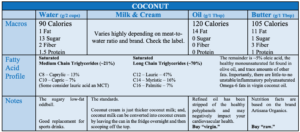
Coconut water is the translucent fluid found in the core of young coconuts. It is sugary with little-to-no fat (all other coconut products are fatty) and full of electrolytes. If you’re on a low-carb diet, avoid coconut water. If not, it’s a great substitute for Gatorade.
Coconut milk comes from the fatty flesh of the coconut and is made by boiling or blending the flesh with water in about a one-to-one ratio. Great for curries.
Coconut cream is basically the same thing as coconut milk, except the coconut meat-to-water ratio is about four-to-one. Great for desserts.
Coconut oil (refined) is pure coconut fat, just as olive oil is pure fat from the olive fruit (yes, both coconut oil and olive oil are, technically speaking, fruit juices). If it’s not labeled as “virgin” coconut oil, then it is refined, which means the oil may have been heated, bleached, and/or deodorized. This doesn’t just sound bad, it is bad. The refining process strips the oil of over 80% of its healthy disease-fighting polyphenols and generates cell-toxic hydrogen peroxide.
Coconut oil (virgin) hasn’t been harmfully treated with heat or chemicals, like its abused sibling. This means it contains about seven-times more healthy polyphenols as does refined coconut oil. (Examples of virgin coconut oil polyphenols for your googling pleasure: caffeic acid, p-coumaric acid, ferulic acid, methyl catechin, dihydrokaempferol, gallic acid, quercetin, and myricetin glycoside.)
Furthermore, and this is IMPORTANT, while the majority of the scientific literature on the impact of coconut oil on cholesterol and heart health reports neutral-to-harmful effects, this umbrella view does not distinguish between refined and virgin oils. Interestingly, according to a brand new (at the time of this writing: January 2020, doi: 10.1016/j.mad.2020) review article on coconut oil, published in the journal of Mechanisms of Aging and Development, the two studies that have used virgin coconut oil report significant elevations in ‘good’ HDL cholesterol and no changes in ‘bad’ LDL cholesterol, while all other clinical reports using refined coconut oil report increased ‘bad’ LDL cholesterol. (As an aside, LDL is not completely bad, but that’s a topic for another post.)
The takeaway is that refined coconut oil is probably unhealthy, whereas virgin coconut oil is probably healthy. Processing matters! Please choose virgin!
Coconut Butter (raw) is simply whole coconut meat that’s been drained of water and ground into a pasty substance, similar to peanut butter. I’m going to go on a little bit about this one because (i) it’s probably the coconut product you haven’t heard of before and (ii) it is the best coconut product around for nutrition, versatility, and taste! By the way, that’s a fact, not my opinion (wink, wink, nudge, nudge).
Nutrition. Because it’s whole coconut meat that has not been roasted, toasted, heated above 118°F (that’s what “raw” means), it contains the same healthy polyphenols as virgin coconut oil, plus fiber and protein. But make sure to get it labeled RAW.
Versatility. Melt it and drizzle it over yellow squash or berries. Use it as the base for curries and stews. Use it as a dip for chocolate or macadamia nuts. Simply toss it with your favorite neutral protein, like shrimp, chicken, or tofu and give it a quick stir-fry. Blend it in a smoothie. Make coconut ice cream. Or, my favorite, eat it with a spoon!
Taste. Trust me, it’s magical. Seriously, I don’t understand how, but it’s sweet despite having almost no sugary carbohydrates. In fact, from my personal experimentations, it appears to drop my blood sugar consistently (by about 5-10 mg/dL) in as little as thirty minutes. Go figure.
A reliable brand that I have used for some scientific experiments is Artisana Organics Raw Coconut Butter, which you can get at Whole Foods or online (even at Oxford, where I currently live… thank the coconut gods!).

*The views and opinions expressed herein are those of the author and do not necessarily reflect the views of MDLingo.com, its affiliates, or its employees.